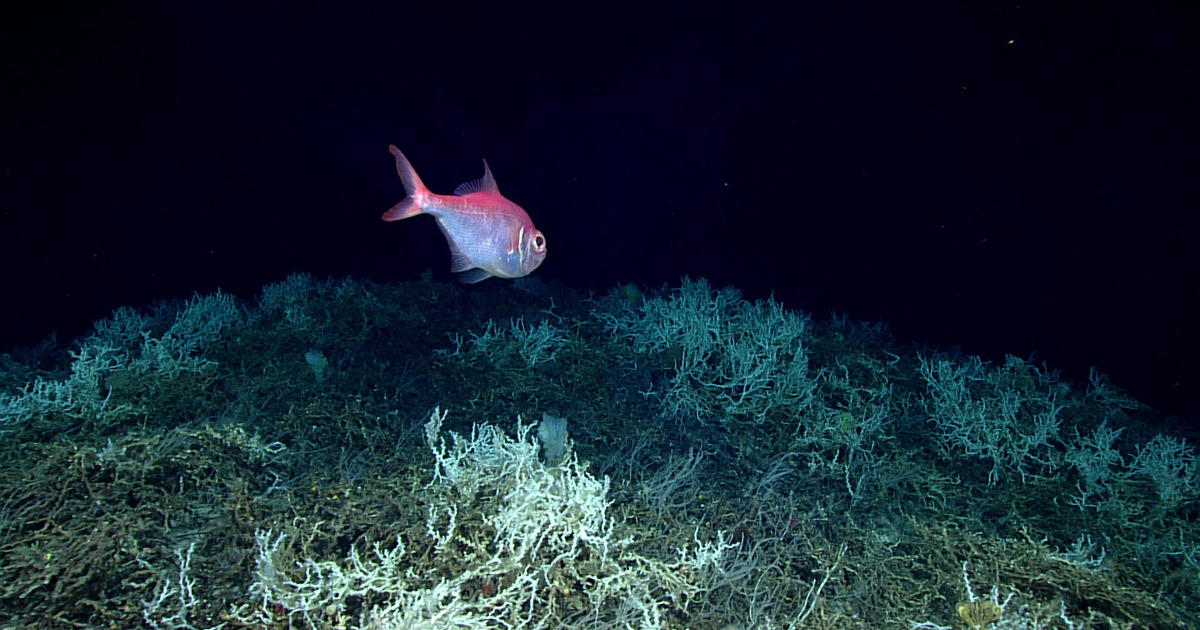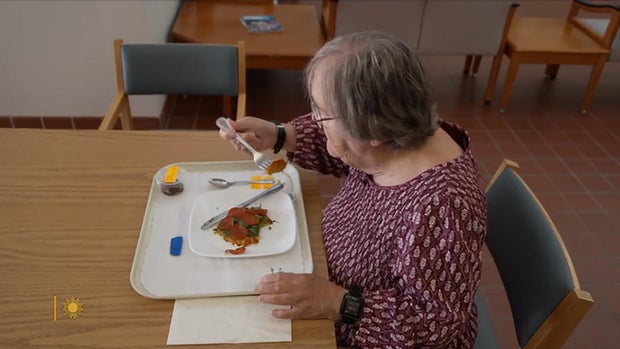CBS News
See maps of the largest-ever deep-sea coral reef that was discovered in an area once thought mostly uninhabited

After a disastrous year for coral reefs in which abnormally high ocean temperatures served a fatal blow to many of the vital underwater ecosystems, researchers have found a glimmer of hope off the coast of the U.S. – the largest-ever deep-sea coral reef.
It’s been known since the 1960s that there were massive mounds of cold-water coral off the East Coast, and for years, NOAA researchers say they thought their study area, the Blake Plateau, was “sparsely inhabited.” But more than a decade of mapping and exploration “revealed one of the largest deep-sea coral reef habitats found to date anywhere in the world,” NOAA Ocean Exploration operations chief Kasey Cantwell said.
Researchers found the reef system in a study area of the Blake Plateau nearly the size of Florida, ranging roughly from Miami to Charleston, South Carolina. The underwater seascape turned out to be 310 miles long and 68 miles wide, NOAA said, and covers 6.4 million acres, an area larger than Vermont.
The largest area found has been nicknamed “Million Mounds” by scientists, NOAA said, and is mostly made up of stony, cold-water coral known as Desmophyllum pertusum – previously called Lophelia pertusa – that’s commonly found between 656 feet and 3,280 feet below the ocean surface. At those depths, there is no sunlight and the water has an average temperature of 39 degrees Fahrenheit.
NOAA Ocean Exploration/Courtesy of Sowers, et al.
The newly uncovered region has the “most extensive” ecosystem of Desmophyllum pertusum ever found within U.S. waters, the study authors said, with mounds estimated to be thousands of years old.
But as study authors noted, habitats for these types of coral are “slow-growing, long-lived and fragile.” Human activities, including trawling, pipelines and oil and mineral production and exploration, make these areas “particularly vulnerable.”
“Many [deep-sea corals] live for hundreds of years, with some colonies living over 4,000 years,” NOAA says, with latest discovery revealing nearly 84,000 individual coral mound peak features. “Over time, these slow-growing corals can build mounds that rise over 150 meters (500 feet) off the seafloor.”
Image courtesy of the NOAA Office of Ocean Exploration and Research, Windows to the Deep 2019
Roughly half of United States’ marine waters and 75% of the world’s oceans have not yet been mapped, Derek Sowers, mapping operations manager for the Ocean Exploration Trust, said in a statement by NOAA. Sowers, the lead author of the study that outlined the discovery, said that their finding is “a perfect example of what we can accomplish” when resources are pooled.
“Past studies have highlighted some coral in the region, particularly closer to the coast and in shallower waters, but until we had a complete map of the region, we didn’t know how extensive this habitat was, nor how many of these coral mounds were connected,” Cantwell, the operations chief, said. “This discovery highlights the importance of exploring our deepwater backyard and the power of interagency collaboration and public-private partnerships.”
Derek C. Sowers, et al., “Mapping and Geomorphic Characterization of the Vast Cold-Water Coral Mounds of the Blake Plateau”
Last year proved to be difficult for shallower reefs off Florida’s coast. Researchers found “100% coral mortality” at one restoration site in July that has been long frequented by snorkelers and divers. another coral restoration site lost “almost all of the corals,” caretakers said, as ocean temperatures soared to levels far above the norm, at some points in the triple digits.
While coral bleaching from high temperatures may not be a significant threat to these systems right now, NOAA says that human activities pose a major threat to these systems, which provide habitat to invertebrates and fish. Many of these areas are also where oil and gas operations are conducted, NOAA said, making them susceptible to oil spills. Mineral mining also poses a threat, as the study authors noted.
“Mining machines are large and may permanently remove large areas of deep-sea coral habitat,” NOAA said. “In addition, future impacts from climate change are not well understood, but increasing temperatures may shift species’ distributions and increasing acidity may weaken coral skeletons, particularly in deeper waters where the impacts of ocean acidification are thought to be greatest.
NOAA says that finding this site and the coral that inhabits it will help scientists better understand the resilience of deep-sea species. They added that having that information allows researchers to better develop plans to protect the corals of the deep sea, which account for more than half of all known coral species.
CBS News
A study to devise nutritional guidance just for you

It’s been said the best meals come from the heart, not from a recipe book. But at this USDA kitchen, there’s no pinch of this, dash of that, no dollops or smidgens of anything. Here, nutritionists in white coats painstakingly measure every single ingredient, down to the tenth of a gram.
Sheryn Stover is expected to eat every crumb of her pizza; any tiny morsels she does miss go back to the kitchen, where they’re scrutinized like evidence of some dietary crime.
Stover (or participant #8180, as she’s known) is one of some 10,000 volunteers enrolled in a $170 million nutrition study run by the National Institutes of Health. “At 78, not many people get to do studies that are going to affect a great amount of people, and I thought this was a great opportunity to do that,” she said.
CBS News
It’s called the Nutrition for Precision Health Study. “When I tell people about the study, the reaction usually is, ‘Oh, that’s so cool, can I do it?'” said coordinator Holly Nicastro.
She explained just what “precise” precisely means: “Precision nutrition means tailoring nutrition or dietary guidance to the individual.”
The government has long offered guidelines to help us eat better. In the 1940s we had the “Basic 7.” In the ’50s, the “Basic 4.” We’ve had the “Food Wheel,” the “Food Pyramid,” and currently, “My Plate.”
CBS News
They’re all well-intentioned, except they’re all based on averages – what works best for most people, most of the time. But according to Nicastro, there is no one best way to eat. “We know from virtually every nutrition study ever conducted, we have inner individual variability,” she said. “That means we have some people that are going to respond, and some people that aren’t. There’s no one-size-fits-all.”
The study’s participants, like Stover, are all being drawn from another NIH study program called All Of Us, a massive undertaking to create a database of at least a million people who are volunteering everything from their electronic health records to their DNA. It was from that All of Us research that Stover discovered she has the gene that makes some foods taste bitter, which could explain why she ate more of one kind of food than another.
Professor Sai Das, who oversees the study at Tufts University, says the goal of precision nutrition is to drill down even deeper into those individual differences. “We’re moving away from just saying everybody go do this, to being able to say, ‘Okay, if you have X, Y and Z characteristics, then you’re more likely to respond to a diet, and somebody else that has A, B and C characteristics will be responding to the diet differently,'” Das said.
It’s a big commitment for Stover, who is one of 150 people being paid to live at a handful of test sites around the country for six weeks – two weeks at a time. It’s so precise she can’t even go for a walk without a dietary chaperone. “Well, you could stop and buy candy … God forbid, you can’t do that!” she laughed.
While she’s here, everything from her resting metabolic rate, her body fat percentage, her bone mineral content, even the microbes in her gut (digested by a machine that essentially is a smart toilet paper reading device) are being analyzed for how hers may differ from someone else’s.
Nicastro said, “We really think that what’s going on in your poop is going to tell us a lot of information about your health and how you respond to food.”
CBS News
Stover says she doesn’t mind, except for the odd sounds the machine makes. While she is a live-in participant, thousands of others are participating from their homes, where electronic wearables track all kinds of health data, including special glasses that record everything they eat, activated when someone starts chewing. Artificial intelligence can then be used to determine not only which foods the person is eating, but how many calories are consumed.
This study is expected to be wrapped up by 2027, and because of it, we may indeed know not only to eat more fruits and vegetables, but what combination of foods is really best for us. The question that even Holly Nicastro can’t answer is, will we listen? “You can lead a horse to water; you can’t make them drink,” she said. “We can tailor the interventions all day. But one hypothesis I have is that if the guidance is tailored to the individual, it’s going to make that individual more likely to follow it, because this is for me, this was designed for me.”
For more info:
Story produced by Mark Hudspeth. Editor: Ed Givnish.
“Sunday Morning” 2024 “Food Issue” recipe index
Delicious menu suggestions from top chefs, cookbook authors, food writers, restaurateurs, and the editors of Food & Wine magazine.
CBS News
A new generation of shopping cart, with GPS and AI

Watch CBS News
Be the first to know
Get browser notifications for breaking news, live events, and exclusive reporting.
CBS News
“All hands on deck” for Idaho’s annual potato harvest

Watch CBS News
Be the first to know
Get browser notifications for breaking news, live events, and exclusive reporting.















